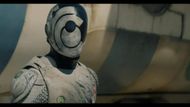Murderbot recently premiered, and it’s already capturing the attention of both audiences and critics. It doesn’t take more than a couple of episodes to realize Murderbot isn’t playing by the usual sci-fi rulebook. Sure, it’s got the futuristic setting, but this show hits different. It’s sharp, quick-witted, and not afraid to make you squirm a little as it holds up a mirror to questions about autonomy, consciousness, and how much of ourselves we’re handing over to technology, which, let’s be honest, feels like the question of the moment with AI creeping into every corner of life.
But honestly, what makes the show stand out isn’t just the action or the snarky humor. It’s the fact that the show actually trusts you to keep up. It’s not here to spoon-feed answers. Instead, it throws you headfirst into big, messy questions about freedom, identity, and what it really means to belong in a world that’s increasingly run by machines. Yeah, there’s space travel, some wild tech, and plenty of chaos. But at its core? This is a story about the awkward, all-too-human fight to figure yourself out, especially when everything and everyone around you keeps trying to shove you into a box you never asked to be in.
Murderbot, the series: sci-fi that feels disturbingly real
Based on Martha Wells’ award-winning book series The Murderbot Diaries, the show follows a SecUnit, a part-organic, part-mechanical security unit, that hacks its own governor module to disable its obedience protocols and gain autonomy… or at least tries. Despite craving isolation and avoiding human interaction at all costs, the series finds itself repeatedly entangled in messy, very human relationships.
The brilliance of the show lies in how it balances these existential questions with dry, often hilarious commentary. Murderbot isn’t your typical hero; it’s anxious, cynical, and would rather binge-watch soap operas than deal with people. That reluctant hero energy is exactly what makes it so relatable and refreshing in a genre often dominated by grandiose, fearless protagonists.

Plot overview of the first season
In its first season, the show signs up for what seems like a straightforward job, protecting a group of scientists on a remote planet. Simple enough, right? Not even close. What kicks off as routine security work quickly unravels into a chaotic mess of corporate greed, shady conspiracies, alien threats, and, to top it all off, a full-blown identity crisis. As Murderbot scrambles to figure out who’s behind the sabotage, it also has to wrestle with something way more uncomfortable than hostile drones: its own programming, a growing discomfort with emotions, and the deeply inconvenient attachments it starts forming with the very humans it was supposed to keep at arm’s length.
The show strikes a perfect balance between fast-paced action and witty, introspective dialogue, never losing the signature sarcasm that fans of the books love. And beneath the explosions and plot twists, there’s a surprisingly touching story about agency, vulnerability, and the complicated mess of caring for others, even when you desperately wish you didn’t.
Alexander Skarsgård on what hooked him about
Murderbot
In an interview with Entertainment Weekly, Alexander Skarsgård, who voices and performs the lead character, said,
“It’s such a refreshing, unique character. I’ve never played anything like it.”
What drew him in most was the contradiction at Murderbot’s core. He explained,
“The humor, the reluctance, the way it absolutely hates humans but also protects them… that’s such a beautiful, fun dynamic to explore as an actor.”
The actor made it clear how relevant the story feels right now. We’re constantly surrounded by conversations about AI, automation, and what it even means to be human these days. Murderbot doesn’t shy away from any of it; instead, it dives straight in, making you laugh while also forcing you to sit with some pretty unsettling questions. Skarsgård noted that one of the most rewarding challenges was capturing Murderbot’s inner tension, a being designed for violence who, ironically, spends most of its time trying to avoid both violence and people. It’s that push and pull between wanting freedom and figuring out what freedom even means that made this character so exciting to step into, a tension Skarsgård clearly found fascinating to explore.

A script that couldn’t be more relevant in the AI era
The show arrives at a time when society is actively grappling with the ethical and social impacts of artificial intelligence. Skarsgård emphasized how that made the role even more compelling.
“The show raises serious questions about free will, identity, and even loneliness. It’s funny, but it’s also incredibly real when you think about where technology is heading.”
And it’s not just about AI in the literal sense. The story resonates with anyone who has ever felt disconnected, misunderstood, or overwhelmed by systems, whether those systems are technological, corporate, or deeply personal.
Audience reception and critical response
Since landing on screens, Murderbot has been racking up some seriously glowing reviews. As of May 2025, it’s rocking a 97% critics score and a solid 79% audience rating on Rotten Tomatoes, not too shabby for a socially anxious robot. Reviewers have been raving about how the show nails that tricky balance between sharp humor, real emotional depth, and some pretty biting social commentary. And when it comes to Alexander Skarsgård’s performance, the praise is loud and clear; critics are calling it
“brilliantly sarcastic yet unexpectedly moving.”
The audience response has been just as strong. The series ranked among the top three most-watched shows on Apple TV+ during its premiere week, outperforming several major franchise releases.

A new sci-fi classic in the making
With razor-sharp writing, brilliantly layered characters, and a story that hits way closer to home than most of us would like to admit, Murderbot delivers far more than just great sci-fi. It’s a punchy, timely reflection on freedom, identity, and what it actually means to be alive, whether you’re human, machine, or something awkwardly stuck in between. And honestly, in a world where the line between humanity and technology keeps getting blurrier by the day, this show couldn’t feel more relevant, or more necessary.
